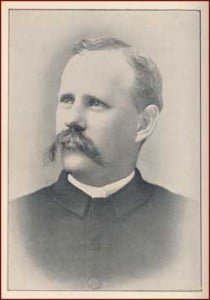Eighty years ago, on June 30, 1934, there was an observance of the fiftieth anniversary of the Korean mission started by the Presbyterian Church in the U.S.A. Other denominations had their own missions in that land. The Southern Presbyterian Church (properly, the Presbyterian Church, U.S.) had a substantial mission there as well, one which was greatly blessed of the Lord, and we may speak of the PCUS mission later.
But for today, reading briefly in The fiftieth anniversary celebration of the Korea Mission of the Presbyterian church in the U.S.A., June 30-July 3, 1934 by the Rev. Harry A. Rhodes, we come to what is for us the heart of the subject, a paper presented by the Rev. Herbert E. Blair, under the title of “Fifty Years of Development of the Korean Church.”
The Role of Missionaries
According to the Rev. Herbert E. Blair, three main principles undergirded the PCUSA mission to Korea in the period between 1884-1934. These were: (1) the supreme place given the Bible, with its simple Gospel message as the inspired, authoritative Word of God. (2) the common determination to make the Korean Church an indigenous church from the beginning, self-propagating, self-instructing, and self-governing. And (3) a spirit of comity and cooperation.
Persecution
But Blair also notes that there was great opposition to the gospel ministry in Korea in those days. “Men were imprisoned and flogged and threatened with death for helping the foreigners bring in the Gospel. Terrible persecutions were inflicted by hostile communities or privately by families or by fathers and husbands. Young widows of the Church were snatched and sold by heathen relatives and terribly abused. Wives were beaten, dragged out of churches and through the streets by their hair and cursed, and their clothes hidden so that they could not go to church again. Some were locked up and food denied them. They were cast off for Christ’s sake. Young boys suffered terrible beatings at the hands of brothers and fathers and were driven from home. Young girls were dragged away to heathen marriages and tortured if they protested. If they fled they were arrested and forced back into weddings they could not escape.”
The Bible and the Korean Church
Rev. Blair continues: “But by God’s grace, the Korean Church grew and became established—established upon the very best and only true Foundation. Writing from his vantage point in 1934, Dr. Blair states, “Bible study has been magnified in the Korean Church. The Bible has been ever at the side of leaders and followers alike. The Bible has been a passion with many pastors and teachers. Rev. Kil Sun-chu [or, Kil Son-ju, 1869-1935], the blind preacher of Pyongyang, has been first of all a diligent Bible student. He had studied all the old cults, but nothing brought peace till his soul began to feed on the Word of God. Pastor Kil has been an inspiring model before the eyes of the whole Church. His sight failed him but Dr. H.C. Whiting operated and enabled him to read again. This past generation pictures Pastor Kil always standing in the midst of great Bible classes, holding up his Bible close to his big, round, radiant face so that through his immense lenses he could himself read the Scriptures and then pour out his great soul in vision and plea. He has so studied and taught the Bible that he can repeat whole books. He has repeated the Revelation hundreds of times. Similarly, most of the leaders of the Church have been good Bible students. Their Bibles are filled with notes, worn and black from Genesis to Revelation. Some of them know their Bibles so well that they are veritable concordances. Such examples have helped the whole church to become a Bible-studying, Bible-loving church. Even old grandmothers and ignorant farmers have been inspired to learn to read so they too could know God’s Word.”
“One can tell a Christian home by the Bible on the floor or on the box at the window or the little table. In their homes family prayers have not only been for daily devotion but they have also been the family schools where the fathers and mothers, aged parents and little children, have gathered in circles about the little oil lamps on the floors, with their Bibles open before them, reading around, verse after verse, the fathers often pronouncing syllable after syllable for the little children to repeat till all have learned to read. Probably all who have spent any length of time in Syen-chun, have been impressed when late at night or earlyt in the morning, while going through the street, passing house after house, they have heard the sound of family prayers or the muffled tone of song. The open Bible is the family altar. All over Korea for years, in multitudes of homes, they have had such family prayers.”
Words to Live By:
Much of this account seems so similar to accounts of other times of God’s great blessing upon His Church. And consistently in each case, a faithful devotion to the Word of God and to prayer undergirds each of those times of blessing. Christian, where is your Bible? Is it gathering dust? Or is it your daily companion? And are you constant in prayer, seeking your Father’s face, drawing near not just with your daily burdens, but also with groanings and petitions for the Church at large, that the Lord would be glorified before a watching world? Be constant in God’s Word and in prayer, and watch expectantly to see how the Lord will work. Pray that once great denominations in the U.S.A. would again be seized with the truth of the Bible and return to a faithful proclamation of the Gospel. Pray too that we who consider ourselves orthodox would indeed maintain our first love in all humility and obedience.

